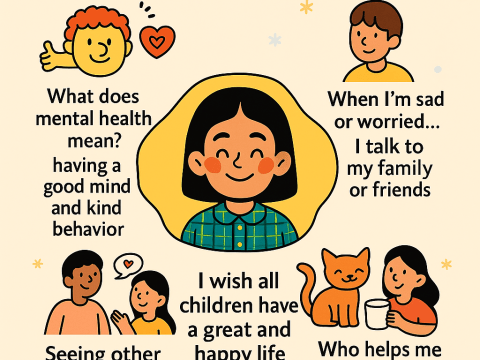WMHD 2025: Listen to the Voices of Children in Iraq

Mental health is about feeling safe, supported, and hopeful. For children in Iraq, that hope is often tested. Decades of conflict, displacement, and hardship have left deep emotional scars on many families. The situation is made more complex by the growing impact of climate change, which causes droughts, heatwaves, and uncertainty about the future.
According to the World Health Organisation (WHO)–Unicef Joint Programme on Mental Health and Psychosocial Well-Being (2024), Iraq continues to face a critical shortage of mental health services. The country has fewer than one psychiatrist per 100,000 people and only around 2% of the national health budget is allocated to mental health.
A recent Unicef-supported study using data from Iraq’s Multiple Indicator Cluster Survey (MICS) found that 22% of children show symptoms of depression and 38% experience anxiety — a reflection of the lasting impact of insecurity, displacement, and poverty on young lives.
The Voices of Children
This year, World Vision Iraq initiated the Children and Youth Working Group of Iraq, inviting children to share what mental health means to them and how they find peace. Their words speak of honesty, courage, and care — reminding us all what well-being truly means.
“Mental health means someone has a good brain and behaviour.” – Hussein
“It’s very important, because if your mental state is bad, even your whole life feels heavy.” – Yara
“We need to take care of ourselves just like we take care of our bodies, so we can feel comfortable and at peace.” – Dana
“Without mental health, the body doesn’t function properly and we can’t live comfortably.” – Rama
“Mental health means taking care of ourselves so life isn’t heavy.” – Omar
When asked what makes them feel happy or calm, the children answered from the heart:
“When I listen to the Qur’an, pray, or go out for a walk.” – Ali
“When I play with my friends or listen to songs I like.” – Noor
“Seeing others happy and not fighting or yelling.” – Hussein Ahmed
“I feel happy when I succeed and work hard every day.” – Sara
When sadness or worry comes, the children already understand the value of talking and connection. They also spoke about who helps them through difficult times:
“I try to talk to my friend about it.” – Khalid
“I talk to my mom or go outside to play so I can relax.” – Dana
“My close friend and sometimes my brother help me when I’m sad.” – Yara
“My mom and dad, and my cat.” – Hussein
Finally, they shared heartfelt messages for other children on World Mental Health Day:
“Take care of yourselves, don’t keep sadness inside — talking about it helps.” – Sara
“Talk about what bothers you, and keep smiling always.” – Noor
“If you feel sad, upset, or afraid, you must talk to your mum or dad, because talking helps, while silence hurts.” – Rama
“I wish for all children to have a great and happy life.” – Hussein
Listening, learning, and acting
Mental health begins with listening — with families, friends, and communities who make children feel safe to speak.
The voices of children remind us that their resilience grows when they are heard and supported. Through the Children and Youth Working Group of World Vision Iraq, and with the collaboration of humanitarian partners, schools, and local organisations, we continue to give children a platform to express their feelings and shape the solutions that affect their well-being.
On this World Mental Health Day, the words of these children call on us to act — to invest, to care, and to make space for every child’s mind to heal and grow in peace.